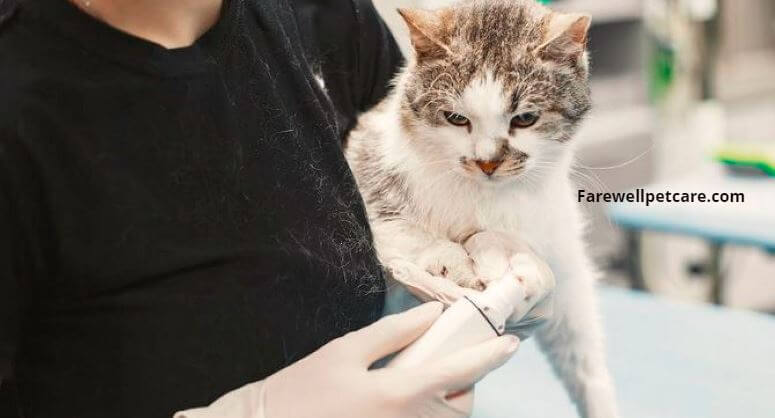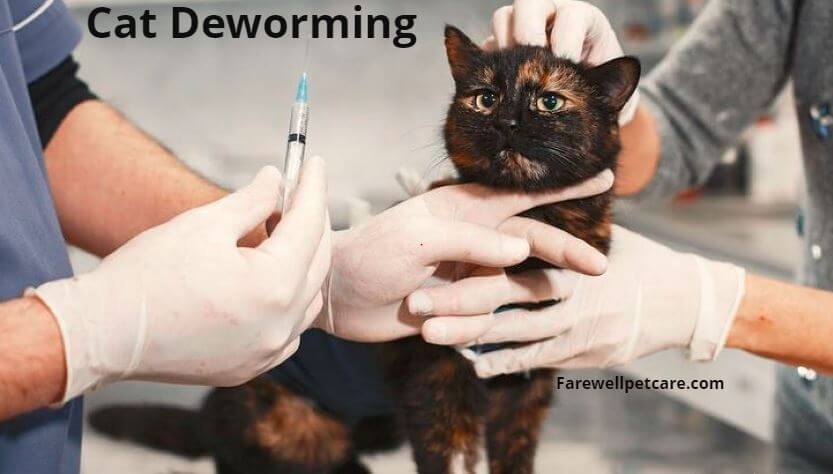If you’ve ever wondered, “How long after deworming a cat are the worms gone?” you’re not alone. Your feline’s health should be a top priority; you can achieve that by deworming the cat regularly. However, how long will it take for the dewormers to eradicate the parasites completely?
There are many factors that decide how long it takes for dewormer to work in cats.
After deworming a cat, the worms should be gone in between 3 days and 3 weeks. This period depends on the type of worm and the type of dewormers prescribed by your vet. While some worms are easy to eliminate from a cat, others take longer and will need more medications to eradicate them with their larvae and eggs.
In the rest of this article, I’ll explain how long it takes after deworming a cat to eradicate the worms. I’ll talk about the different intestinal worms that affect cats and how to know when your feline friend has these parasites. Keep reading to learn more!
How Long After Deworming a Cat Are the Worms Gone? Factors That Affect the Duration

You now know that it takes between 3 days and 3 weeks after deworming a cat for the worms to be gone. However, the concern remains, why this variation in time?
Knowing the factors affecting how long does dewormer take to work on cats is essential for optimal cat health. These factors include:
1. The Type of Worm
Cats are affected by different worms; some are more resistant to dewormers than others. Knowing the type of worm in your cat’s body will help you choose the best wormer, which subsequently affects the duration it takes after deworming a cat for the worms to be gone.
Tapeworms are among the worms that affect cats. Luckily, treatment for tapeworms in cats is easy and takes a shorter time. You can expect the tapeworms to be gone after three days of deworming.
On the other hand, roundworms in cats can take up to 3 weeks or more for them to be gone after deworming a cat. Roundworms are more resistant to dewormers and require multiple medication sessions before they are eliminated from your feline friend’s system.
Moreover, roundworms have larvae and eggs that linger in your cat’s body, making their eradication difficult. Your vet will recommend the best dewormers for roundworms and the necessary follow-up procedures.
Also Read: Why Is My Kitten So Hungry All the Time? 5 Reasons and What to Do
2. The Number of Worms
The number of individual worms in your cat’s body affects the duration it takes after deworming a cat for the worms to be gone. Cats with more severe infestation take longer to eradicate all the worms in their system.
The longer it takes before you deworm your cat, the more worms will be present. Adult female worms produce fertile eggs that hatch within 7 to 14 days and cause a heavier infestation. Therefore, it will take longer to eradicate the worms from your cat’s body if deworming takes longer.
A rule of thumb is to deworm your pet as soon as you notice any signs of an infestation (I will discuss these signs below).
3. The Type of Dewormer Used
Worms are killed by different dewormers, each with varied effectiveness on a particular worm species. The type of dewormer used to treat your feline friend will affect the outcome of the treatment, including how long it takes for the worms to be gone after deworming a cat.
For tapeworms, praziquantel and epsiprantel are two of the most common dewormers used on cats, and they’ll usually be done away with after three days. On the other hand, roundworms will require more aggressive dewormers such as Panacur or fenbendazole and may need multiple doses before their complete eradication.
It’s worth noting that a dewormer used for one worm will not be effective for the other. Most cat parents make the mistake of using the same dewormer for different types of worms, which can cost your cat their health.
It’s essential to consult your vet on the best dewormer for your cat’s particular case to ensure optimal treatment.
The type of dewormer also decides how long does dewormer take to work in cats.
An Interesting Read: How to Say Goodbye to a Dying Cat
4. Your Cat’s Health Status
The overall health status of your cat affects how long it takes after deworming a cat to get rid of the worms. For example, it may take longer to eradicate the worms if your feline friend has an immune system weakened by other diseases or parasites.
Your vet will be able to determine your cat’s health status and suggest a suitable dewormer that can get rid of the parasites within the shortest time possible. With that said, you should always be prepared for some variance in treatment times depending on the abovementioned factors.
Point to Note: After deworming your cat, you’ll start noticing worms in the litter box and on your pet’s fur. This means that the dewormer has started taking effect, and you should schedule another visit to the vet soon after.
Most importantly, have patience with your cat during the treatment period – they don’t like being poked or prodded in any way! But by doing so, you’ll be able to get rid of the worms in no time, leaving your furry pal feeling comfortable and healthy.
Intestinal Worms That Affect Cats

The most common type of worms that affect cats include:
- Roundworms
- Hookworms
- Tapeworms
Roundworms
Roundworms affect kittens and adult cats.
Trans-mammary infection (mother to kittens) is one of the most common modes of roundworm transmission in kittens. Un-treated nursing mothers can transfer roundworm larvae to their young through breastfeeding.
Your cat can also get infected by swallowing an egg with ineffective roundworm larvae. The larvae hatch in the cat’s intestines, developing into adults and laying eggs that are passed with faeces.
Hookworms
As the name suggests, hookworms latch onto the intestinal walls of the cat using their teeth. After latching, they feed on your cat’s blood, causing anaemia and other health issues.
Ancylostoma tubaeforme is the most aggressive form of hookworm that affects cats. It can cause severe anaemia and even death in extreme cases.
Cats mainly contract hookworms by swallowing the egg. The female hookworm passes many microscopic eggs into the cat’s faeces, contaminating soil and other surfaces.
Cats inadvertently swallow the eggs in situations like:
- When grooming their feet
- When ingesting infected prey
- When grooming their fur
Tapeworms
Cats can also get infested with tapeworms that are contracted through the ingestion of fleas or mice. Tapeworms attach themselves to the walls of your cat’s intestines using suckers and hooks and feed on partly digested food in the intestine.
Tapeworms produce white, segmented eggs that are passed out in the cat’s faeces.
Kittens can get hookworm infections through the mother’s milk, while adult cats become infected by swallowing contaminated soil, feces, or fleas.
Signs That Your Cat Has Intestinal Worms
Worm infestation in cats can be asymptomatic; that’s, cats may not show any symptoms. Whether asymptomatic or symptomatic, it depends on the severity and the type of worm.
It’s advisable to conduct regular deworming because your cat may not show any signs when infested by worms.
In most cases, a cat infested by intestinal worms will show the following signs:
- Weight loss
- Poor coat and hair quality
- Lethargy
- Diarrhoea or vomiting
- Visible worms in the faeces
- Anaemia
In severe cases, cats display the following signs:
- Shock
- Low blood pressure
- Dehydration
- Death
How to Prevent Intestinal Worms in Cats
Intestinal worms are risky and can be fatal, especially in kittens.
Here are some preventive measures you can take to prevent your cat from being infected with worms:
- Maintain high standards of hygiene: Most worms are transmitted through faeces that contain eggs. Therefore, you should remove faeces daily and clean the litter box. You can also disinfect the litter box.
- Avoid overcrowding: Overcrowding increases the chances of your cat getting worm infections as they may come into contact with infected feces.
- Clean your pet’s fur: Regularly groom and brush your cat’s fur to remove dirt and parasites found in their coat. This removes fleas and mice that may carry tapeworms.
- Avoid feeding them raw meat: Raw meat can carry organisms that cause worms. For example, tapeworms can be found in raw meat and affect your cat.
- Regular deworming: Deworming your cat regularly will prevent instances of worm accumulation, a situation that can be fatal. The table below shows the worming schedule for cats and kittens:
| Age | Deworming Frequency |
| 3 to 8 weeks | Every 2 weeks |
| 6 weeks to 6 months | Once a month |
| More than 6 months | Every 1 to 3 months |
Final Thoughts
Deworming a cat is essential for the well-being of your feline friend. Knowing how long after deworming a cat are the worms gone will help you to anticipate the effectiveness of your deworming routine.
It’s advisable to consult a veterinarian before deworming your cat to know the parasite affecting it. This way, the vet will prescribe the appropriate wormers for your cat.
Additionally, to protect your kitty from intestinal worms, you should practice preventive measures like avoiding raw meat and maintaining high hygiene levels in the home.
FAQs
how long after deworming a cat are the worms gone?
After using the dewormer drug, the worms ought to disappear in two to three weeks. However, in some cases, the cat might need a second dose of the dewormer to fully get rid of the worms.
how long does dewormer take to work on cats?
Deworming treatments usually take two to four days to work, so your cat may still have worms after deworming. There are situations where a second dosage is necessary. After using the dewormer drug, the worms ought to disappear in two to three weeks.
what to expect after deworming a cat?
While vomiting, diarrhoea, appetite loss, or increased salivation are not typical adverse effects of dewormer drugs, these can occur in certain cats. If they do occur, these symptoms normally appear 24 hours after starting the medicine and should go away on their own.
You will also notice worms in the litter. This is a sign that the dewormer is working.

